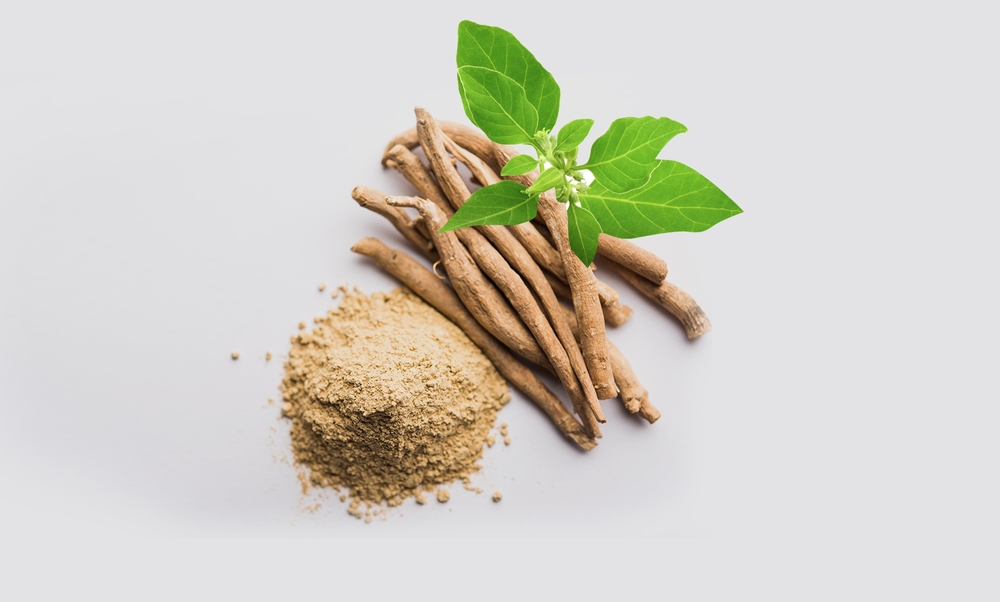- Ashwagandha is a vital part of Ayurveda, an old whole-body or holistic (mind, body, spirit) system of medicine.
- This herb is most commonly used for stress relief.
- The word ‘Ashwagandha’ is Sanskrit for “smell of the horse.”
Known as Indian ginseng, ashwagandha has been used in Ayurveda for thousands of years. This herb, which goes by the botanical name Withania Somnifera, is a known medicinal plant with little yellow flowers. It grows as a small shrub and is native to India and several other areas in Southeast Asia, as well as parts of Africa. The root of the plant is extracted into serums or powders and then used in various Ayurvedic health treatments.
Ashwagandha May Reduce Stress
Those who suffer from stress or anxiety may benefit from regularly taking ashwagandha. In a 2019 study, participants were given ashwagandha daily while researchers observed stress levels using perceived stress scale (PSS) scores and cortisol, or stress hormone, testing. After 8 weeks, participants’ PSS scores and cortisol levels were reduced, indicating success with ashwagandha supplements.
Furthermore, those who participated in the study experienced significantly improved sleep. While further study is needed to confirm the supplement’s efficacy and required dosage when it comes to treating stress, many users believe in its stress-relieving benefits.
It May Stabilize Blood Sugar
Ashwagandha has been thought to stabilize blood sugar levels and lower blood glucose in people with type 2 diabetes. In a 2020 study, ashwagandha was given to diabetic rats over an 8-week period and compared to the common diabetes drug, glibenclamide. Results indicated that ashwagandha produced hypoglycemic results in the subjects.
While these findings are promising, further research is needed to confirm whether the ashwagandha has similar effects on humans and if the herb is safe for those living with type 2 diabetes. As it stands, type 1 diabetics should not take ashwagandha without consulting their physician.
Ashwagandha May Help With Weight Loss
Because it may provide some blood sugar stabilization, ashwagandha may be beneficial for use in weight loss and appetite control. A double-blind, placebo-controlled trial was conducted in 2017 to determine ashwagandha’s body weight management properties. Over 8-weeks, subjects who were given ashwagandha daily experienced a reduction in weight and body mass index.
So, how does it work? Because of its antioxidant properties, it’s thought that this plant may help the body better break down and filter fats and toxins that are ingested.
Men Who Use Ashwagandha May Experience Increased Testosterone and Fertility
According to Natural Medicine Journal, ashwagandha has the potential to improve the volume of healthy sperm in males who are living with infertility, particularly in those who have hypogonadism. Further studies have indicated that ingesting ashwagandha extract can increase testosterone in otherwise healthy males and improve the quality of their sperm.
Of course, it goes without saying that any male who’s experiencing issues with fertility or testosterone should first speak to a healthcare practitioner before experimenting with ashwagandha or any other alternative remedy.
Women Who Use Ashwagandha May Combat Sexual Dysfunction
Women who are experiencing issues such as low libido might consider using ashwagandha to help promote a healthier and more enjoyable intimate life. A 2015 study analyzed the efficacy of ashwagandha in women aged 21 to 50 who were diagnosed with sexual dysfunction.
While findings at the end of the 8-week study were inconclusive in some areas, women who used the supplement reported noticeable improvements. Once again, it’s always important to consult your doctor before taking a supplement.
It May Improve Focus and Concentration
Believers in the benefits of ashwagandha often appreciate its potential for improving focus, concentration, and gross motor functions. A study published in the Natural Medicine Journal in 2014 looked at the herb’s ability to improve cognitive function, including focus, concentration, and memory, as well as sensorimotor functions, auditory reaction times, and mental arithmetic abilities.
The study, which focused on males aged 26 and older, was placebo-controlled and lasted a total of 8-weeks. In subjects that were given ashwagandha supplements, improvement was seen in all areas.
Ashwagandha May Promote Heart Health
Because of the stress-reducing effects of ashwagandha, it’s often said that this herb can have a positive effect on the cardiovascular system and promote a healthier heart. Its ability to reduce cortisol could make it a good supplement choice for those living with heart conditions such as coronary artery disease, hypercholesterolemia, angina, and hypertension.
That said, heart conditions should always be monitored by a qualified healthcare professional, and ashwagandha, as well as other natural supplements, should not replace medical care.
 Shutterstock/Syda Productions
Shutterstock/Syda ProductionsAshwagandha Isn’t for Everyone
While ashwagandha’s long list of benefits is largely backed by scientific studies and research, that doesn’t mean it’s safe or effective for everybody. In fact, this herb is contraindicated for those with a variety of circumstances and conditions, including:
- Pregnancy
- Breastfeeding
- Type 1 diabetes
- Hypertension or hypotension
- Stomach ulcers
- Autoimmune disease, including lupus and multiple sclerosis
- Thyroid disorders
Any person who’s considering adding ashwagandha supplements to their daily routine should consult their pharmacist and healthcare provider first.
The Side Effects of Ashwagandha
Just as with most supplements and medications, ashwagandha has its fair share of side effects. While most of these are usually mild, some users may experience extreme adverse effects, and those who do should stop using it immediately and consult a healthcare professional.
Adverse effects that require medical attention include liver symptoms such as jaundice, dark urine, and abdominal pain, as well as rapid heartbeat and signs of an allergic reaction. Milder side effects that users may experience include nausea, diarrhea, and drowsiness.
How to Take Ashwagandha
Ashwagandha is typically sold as a powder or capsule. When taking this supplement, it’s important to always follow the directions listed on the packaging by the manufacturer.
When taking ashwagandha under the supervision of a naturopath or another healthcare practitioner, the recommended dosage may vary. For those taking this herb to reduce stress and anxiety, the recommended dosage may range from 125-mg to 600-mg daily. In extreme cases, the recommended dosage may be as high as 5-grams per day. That said, always follow the guidance of a health professional.
 novak.elcic / Shutterstock
novak.elcic / ShutterstockResults Can Take Time
Seeing the result of ashwagandha’s benefits can take time, and for most, taking moderate to high doses of the herb usually means that results are seen more quickly.
Regardless of dosage, those taking ashwagandha for stress, sexual health, or heart health aren’t likely to notice a difference in their symptoms for at least 30-days. And while all bodies respond to this herb differently, those using it for weight loss won’t likely experience any measurable results for 4- to 8-weeks.












